Conquest of the Planet of the Apes (1972)
Directed by: J. Lee Thompson
Written by: Paul Dehn
Starring: Don Murray, Natalie Trundy, Ricardo Montalban, Roddy McDowall
USA
AVAILABLE ON BLU-RAY, DVD and DIGITAL, “Unrated” version BLU-RAY ONLY
RUNNING TIME: 98 mins/88 mins
REVIEWED BY: Dr Lenera
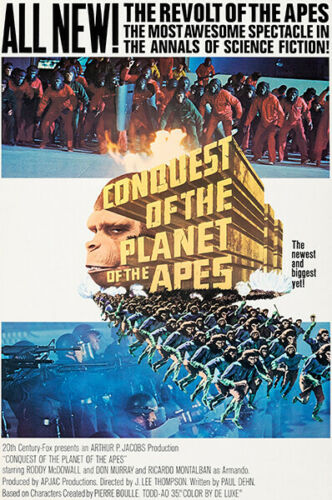
When apes Cornelius and Zira landed on earth in 1973, they can’t have known that they’d bring with them a virus with them which, ten years later after the two were shot and their new-born baby taken in by compassionate circus owner Armando, wiped out all dogs and cats, causing humans to take apes as pets. Now, in 1991, the world is now formed of police states and apes are used as slaves. Caesar is now fully grown and is brought by circus owner Armando to one of the cities to distribute flyers for the circus’s arrival, and is so angered at the harsh treatment of apes that he shouts out “Lousy human bastards”, causing Armando to turn himself in to the authorities and try bluff his way out while instructing Caesar to hide among a group of arriving apes for safety. But how long will Caesar put up with playing slave?….
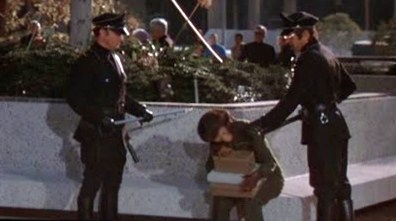
Conquest Of The Planet Of The Apes, of which the much more recent Rise Of The Planet Of The Apes is a very loose remake, could have been the best of the Planet Of The Apes sequels, but is, more than any other entry, severely hampered by its small budget, the tiniest of the series, supposedly required because Paramount had several expensive flops. Of course even as a first-time viewer we know where things are going right from the offset, the ending of Escape From The Planet Of The Apes telling us that any followups would take us towards the first film in a circular time loop much like in The Terminator. But what is basically a science fiction variation on the American Civil Rights situation of the ’60s and early ’70s manages to be admirably ferocious, full-on and adult, with little of the humour, even dark, that we’d seen before; Beneath The Planet Of The Apes may have been astonishingly vicious for a film which had kids take up a large portion of its audience but still no doubt thrilled the younger set, but Conquest Of The Planet Of The Apes may well have lost them. However, the shortage of money means that the ape makeup is a pale shadow of the work of John Chambers with masks that look just like masks, while shooting the same few buildings and outdoor areas from different angles can’t disguise the obvious, the film having a hemmed-in, claustrophobic feel which is hardly right for a story which is about the apes rising up against their human masters. And it’s sort of funny how, after Escape From The Planet Of The Apes contradicted the first two films by having Cornelius say that, actually, apes hadn’t forgotten that an intelligent human society had preceded the ape civilization after all, and knew that they were led to revolt by a simian named Aldo, Aldo isn’t mentioned at all with the leader being named Caesar!
Director J. Lee Thompson had maintained an interest in the franchise ever since producer Arthur P. Jacobs invited him for the original Planet of the Apes and he worked on the initial stages of the project before scheduling conflicts had made him unavailable during its long development process. Series sequel writer Paul Dehn wrote it after being told by Jacobs that this would be the final film in the series. His original script draft showed more of the rapid evolution of the apes from primitive to intelligent and also showed the progression of apes from pets to slaves, but was considered way too expensive to film. The primary location was Century City, Los Angeles, that had previously been part of the 20th Century Fox backlot, plus the University of California, Irvine, in Orange County. Money was saved by TV producer Irwin Allen contributing props and clothes from Voyage to the Bottom of the Sea, The Time Tunnel, and other Allen productions. The script and novelisation describes a nighttime pre-title scene where police on night patrol shoot an escaping ape and discover that his body is covered with welts and bruises as evidence of severe abuse. It was shot but not used; however in a later scene Governor Breck refers to an “Ape that physically assaulted his master,” thereby prompting his aide MacDonald to report that the escape must have been the result of severe mistreatment. Mixed responses to a preview screening caused Jacobs to order cuts to the climax for a ‘PG’ rating to remove shots of gore and dead bodies, and alteration of the ending into something less dark; the latter was done through re-voicing and re-editing including some footage being played backwards. More on that later. In the UK an electrical torture scene and more shots from the climax were cut; these were restored for video though the full uncut version didn’t come out until 2008. It was another hit, especially with black audiences.
The beginning of this film is great, certainly amongst the best of all the apes films. A dissonant chord is heard on the soundtrack as we see one gorilla, then another, and then another, until finally we see an enormous band of them. The camera then pans slowly all over what’s obviously the centre ‘square’ of this town to show us how humans are treating the apes, and it’s not nice, the carrying out of a variety of menial tasks often being enforced by violence from the many police around, some of whom are dressed like Nazis, no, it’s no subtle at all but sometimes that’s just fine. A worn out ape sitting down is tasered back to work while on the loudspeaker we hear of ape gatherings which have to stop now, in some cases “Their masters are to be cited and fined”. There’s a lot of this kind of footage in this movie and it’s sometimes hard to watch, especially when newly arrived apes are beaten into submission. Is it too much? I don’t think so, we have to be totally sympathetic to the apes so we’re totally behind the rise up, but not everyone would agree, and if you think about it there’s not really much plot here. The child of Cornelius and Zira is now grown up and is in town helping Ricardo to distribute leaflets advertising his circus, but can’t keep his mouth shut even though his human father figure Armando has told him to do so. During the commotion Caesar is able to escape and hides in a cage of orangutans, but finds himself being trained for slavery through violent conditioning involving flame throwers, electrocution, a trippy room and truncheon blows. Meanwhile Armando may have said that he was the one who spoke, but he’s not believed and is interrogated by the “authenticator”. This is a real low point in the film’s really cheap but also unimaginative design, this machine, which makes you say the truth even if you’re trying to lie, taking the form of a hanging lamp with a blue bulb inside it.
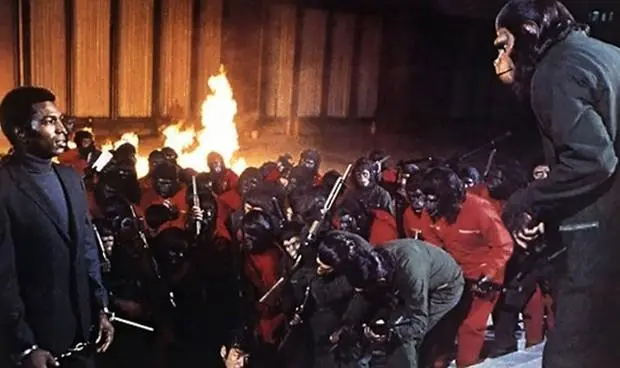
Caesar is sold at an auction to Governor Breck, allowed by his owner to name himself by randomly pointing to a word in a book handed to him. The chimpanzee’s finger rests upon the name “Caesar”, feigning coincidence. He’s then put to work by Breck’s chief aide MacDonald, whose African American heritage allows him to sympathise with the apes to the thinly veiled disgust of his boss, who’s becoming increasingly alarmed by “A rising tide of disobedience and outright defiance”. We know where it’s all going and are basically waiting for the apes to finally say “No”, especially as a romance between Caesar and another chimpanzee named Lisa feels very shortchanged, it being mostly about furtive looks. The event that kickstarts Caesar’s anger is predictable and we’re asked to believe that all apes need to do in order to talk, despite their lack of vocal chords, is have someone show them how. For some reason we see mainly orangutans and gorillas. But we can’t help but cheer when, for example, one gorilla empties the contents of a dust bin all over the road. When the revolt happens we get a superbly sustained battle between troopers and apes that makes up for the small scale by its intensity and good staging, with the apes making up for their lack of firepower with things like nets and fire. The uncut version has really gory footage of rifle butts and bayonets smashing Breck’s men to a pulp. The re-editing of the original cut has Caesar not succumbing to brutality and killing Breck, suggesting that the future may be a bit more favourable to humans than the one that we saw in 1968. But the original cut has, after MacDonald cries ,” I, descendant of slaves, am asking you to spare this human” , Caesar reply “But I was not born human” and let his men smash Breck to death with their rifles. This is much better, being both more powerful and more thought provoking, telling us that the cycle of violence won’t stop and that the apes have become no better than the humans.
You’ve got to love those films that are set in what is now the past yet at the time of making would have been the future. For some reason, in 1973 it was thought that chromium and glass would be the in thing. We don’t get up close to those tower blocks we glimpse in the distance, the budget probably wouldn’t have allowed it, but I think we’re led to believe that they’re not that different from this sleek but drab city centre of monochromatic buildings in a sterile ultramodern style. This certainly adds to the cold, bleak feeling of the film, but also becomes a bit visually monotonous and little real invention is employed. The humans wear black and other muted colors, the high-ups often sporting polar neck jumpers for some reason, while the apes’ suits are bright yellow and red. Don Murray, who played Breck, rehearsed his scenes after translating his dialogue into German “To get this kind of severe feeling of the Nazis“, while Dehn wrote some of his best lines for this film, for example, “When we hate you, we’re hating the dark side of ourselves”, which can be interpreted more than one way. Yes, it’s all very on the nose, but then the previous Ape films were hardly subtle either. I guess the difference is that in those, while the social commentary is definitely present, one can still enjoy them if you ignore said social commentary. In Conquest Of The Planet Of The Apes, it’s totally to the fore, so you really have to be on board with it.
Of course it’s great to have Roddy McDowall back, and playing his previous character’s son, so he’s able to repeat a lot of mannerisms but also do some different things. His best moments are probably when Caesar has to walk and act like a far less intelligent, servile ape and is getting really frustrated by it. These Ape films truly show what a fine actor he was. It’s a shame that we don’t really get to know MacDonald as a character seeing as he’s so important both symbolically and narratively; Hari Rhodes does what he can with the part nonetheless. Thompson is certainly able to keep the pace going and usually seems to do the best he can with the ridiculously small amount of money he was given. One device has a suicidal jump from a high building being shown from the person’s point of view; this may have been done for cheapness but actually adds to the moment. But the makeup really is second rate; even Caesar’s isn’t particularly good, lacking much of the expressivity we’ve seen before. Thompson and cinematographer Bruce Surtees decided to keep the other apes at a distance from the camera and to not hold on the shots of them for very long so that we don’t see many faces in detail, though of course the wonder of High Definition can’t help but make the limitations of the makeup evident no matter what. Tom Scott’s score has some nice dramatic bursts and a few sounds retained from Jerry Goldsmith’s work on Planet Of The Apes, but no memorable motifs, though it does eventually come into its own with terrific percussive scoring for the battle. By now, we’re swept along and desparately want this uprising to succeed. I always begin Conquest Of The Planet Of The Apes by visualising and even writing in my head the more nuanced and also more spectacular movie that it could have been, but after a while I stop doing that and always end up being affected by the power of the film that it already is – and will do even more in the future now that I’ve finally seen the uncut version.
Rating: 











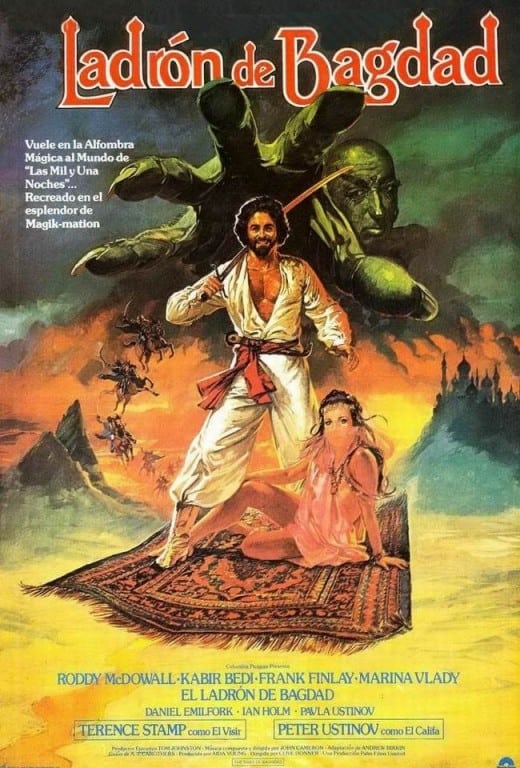
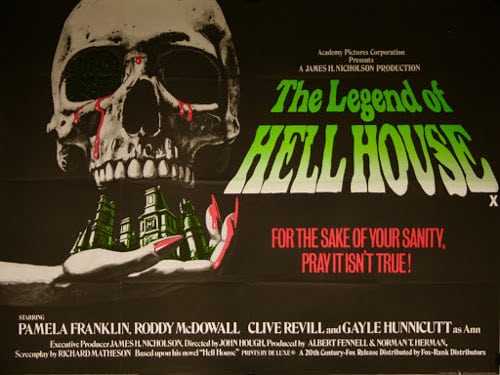
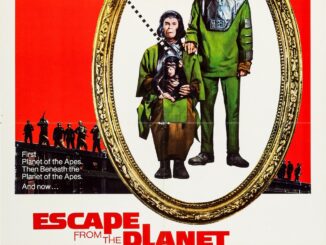
Be the first to comment